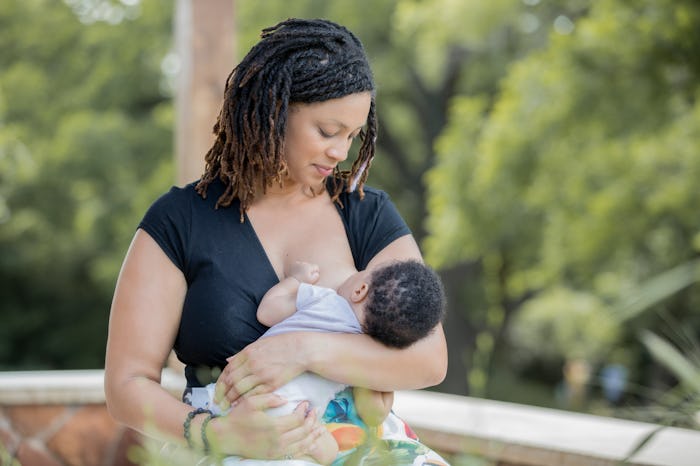Life

Is Breastfeeding Bad For Your Bones? Here's What The Experts Say
Nursing moms experience a lot of changes in their body as a result of lactation. It seems like the process impacts everything from your period to your hunger to your energy levels, but does breastfeeding affect your bones? The answer to that question is a little complicated.
As lactation consultant Vicki Honer, IBCLC, tells Romper, research suggests that mothers may lose bone density while breastfeeding, but "lost bone [is] replaced with fresh, new bone within two years of delivery." However, she notes that there are also some outside factors that play into the overall effect on bone health, including nutrition. Danielle Downs Spradlin, IBCLC, agrees. "Maintaining a lactation-positive diet and supplementing minerals or vitamins as needed" is just as important as prenatal vitamins were during pregnancy, she tells Romper.
In fact, Spradlin likens the body's mammary glands to the placenta. "The placenta is a sophisticated organ that prioritizes the growing fetus," she explains, and the "mammary glands are similarly sophisticated." These similarities emphasize the importance of proper nutrition for nursing moms, since their body is working to keep two people (and their bones) healthy and strong.
A review in the Journal of Family and Reproductive Health noted that women actually begin to lose bone mass during pregnancy, so not all loss is attributed to breastfeeding. Studies in the review showed that women who breastfed continued to lose (minimal) bone density at six months postpartum, whereas bone density in women who did not breastfeed began to increase as early as three months postpartum. However, by 24 months postpartum, women who breastfed experienced more rapid rebuilding than those who did not.
"If lactation is acting on our body systems like bone or skin or digestion, the action has an over all biological advantage," Spradlin explains, because "lactation is the biologically normal conclusion to a pregnancy." Essentially, the body was made to lactate postpartum, so much like it repairs itself after pregnancy, labor, and delivery, it will also repair itself after breastfeeding.
In the end, both experts say the short term effect lactation has on the bones (if there's any effect at all) is not a reason for women to opt out if they otherwise want to breastfeed. There are many long-term benefits of breastfeeding for moms to keep in mind too, Honer says, such as "[reduced] chances of pre and post-menopausal breast cancer, cervical and ovarian cancer, osteoporosis, anemia and urinary tract infections." Not to mention the many positive affects it has on newborns.
Studies referenced:
P. Salari, M.D. and M. Abdollahi, Pharm D; Ph.D., "The Influence of Pregnancy and Lactation on Maternal Bone Health: A Systematic Review," Journal of Family & Reproductive Health, December 2014
https://www.ncbi.nlm.nih.gov/pmc/articles/PMC4266784/#__ffn_sectitle
Experts:
Danielle Downs Spradlin, IBCLC, CLC, NOMAS, BRMT, Oasis Lactation Services
Vicki Honer, BA, IBCLC, With More Than 30 years of Experience and Owner of Lactation Connection